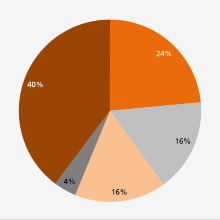The winter survey 2020/2021 for the Energy Efficiency Index (EEI) shows again that efficient energy use in German industry is increasing in importance. It is becoming apparent that the corona pandemic has no lasting negative effect, because companies are setting themselves even more ambitious climate targets than before for 2030.
“After a short-term drop in the wake of the corona pandemic in the spring of 2020, the Energy Efficiency Index stabilized at the previous year’s level. In the case of capital expenditure for energy efficiency, a new record high was only narrowly missed. Despite or perhaps because of corona, the companies surveyed attach even greater importance to energy efficiency than they did six months ago,” says Professor Alexander Sauer, Head of the Institute for Energy Efficiency in Production (EEP) at the University of Stuttgart. Since 2013, the Institute for Energy Efficiency in Production (EEP) at the University of Stuttgart has been surveying current and planned activities and goals of German industrial companies in terms of energy efficiency on a semi-annual basis. The Energy Efficiency Index (EEI) is created in collaboration with the German Energy Agency (dena), the Federation of German Industries (BDI), the Fraunhofer IPA, TÜV Rheinland, and other partners.
This time, more than 880 companies from over 20 sectors participated in the semi-annual survey of the EEI, which always includes different special questions. Among other things, the special questions of the current survey deal with whether and how the corona pandemic has had an effect on a company’s energy efficiency strategy. While 40 percent of the companies surveyed said that the coronavirus has had no effect whatsoever on their energy efficiency strategy and that they continue to adhere to their existing strategy, another 40 percent said that they had implemented their measures earlier than planned or even expanded their activities. In summer 2020, just under 40 percent of the companies indicated that they would have to delay or reduce their energy efficiency measures. In the current survey, this is true for only 20 percent of the companies.
In the past fall, the European Commission supplemented the climate neutrality targets for 2050 with even more ambitious interim targets for 2030. The EEP survey also addressed the question of which aspect(s) companies are focusing their optimization strategy on. The optimization of energy demand was the most frequently cited issue in the survey (30 percent). CO2 reduction accounted for another quarter of the responses, and 18 percent said that they were oriented toward reducing all greenhouse gas emissions and all environmental impacts. Only 5 percent said they had no optimization parameters. The participating companies most frequently cited the combination of energy demand optimization and greenhouse gas emissions as a strategy.
Regarding the aforementioned optimization parameters, the participating German manufacturing companies have set themselves substantial targets for 2030: on average, the aim is to save approximately 26 percent of emissions by 2030 compared with 2019. This is 5 percentage points more than what was targeted for 2025 in the last survey.
On the occasion of the introduction of the national CO2 price in January 2021 and the increase in the European ETS price, the question of whether companies are aware of their own energy-related emissions was also addressed. This was the case with only half of the companies. Companies have a lot to catch up on regarding their ability to determine these emissions. The CO2 price calculator for companies, which was recently published by the Chamber of Industry and Commerce, could help here.
“Despite the very tense atmosphere in German industry because of the corona pandemic, energy efficiency and decarbonization plans continue to gain importance in the companies. Especially in these turbulent and uncertain times, energy efficiency can not only contribute to achieving the climate goals of the European Commission, but also help reduce the companies’ energy costs, respond flexibly to fluctuations in demand, and ensure competitiveness,” says Prof. Sauer.
Expert Contact:
Christian Schneider M.Sc. (Energy Efficiency Index Project Manager), EEP – University of Stuttgart, Nobelstr. 12, D-70569 Stuttgart, Phone: +49 (711) 970-3640, Mail


